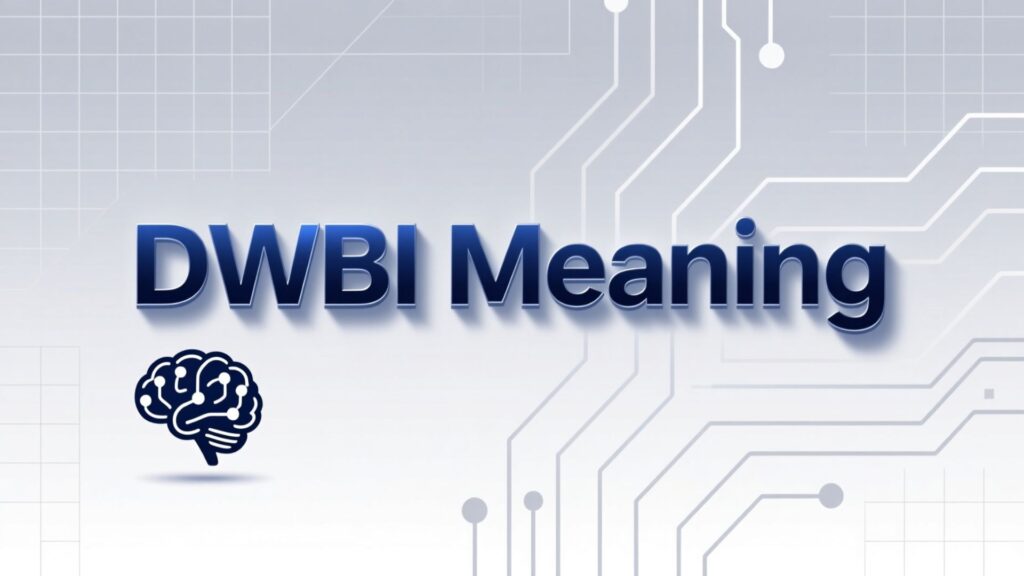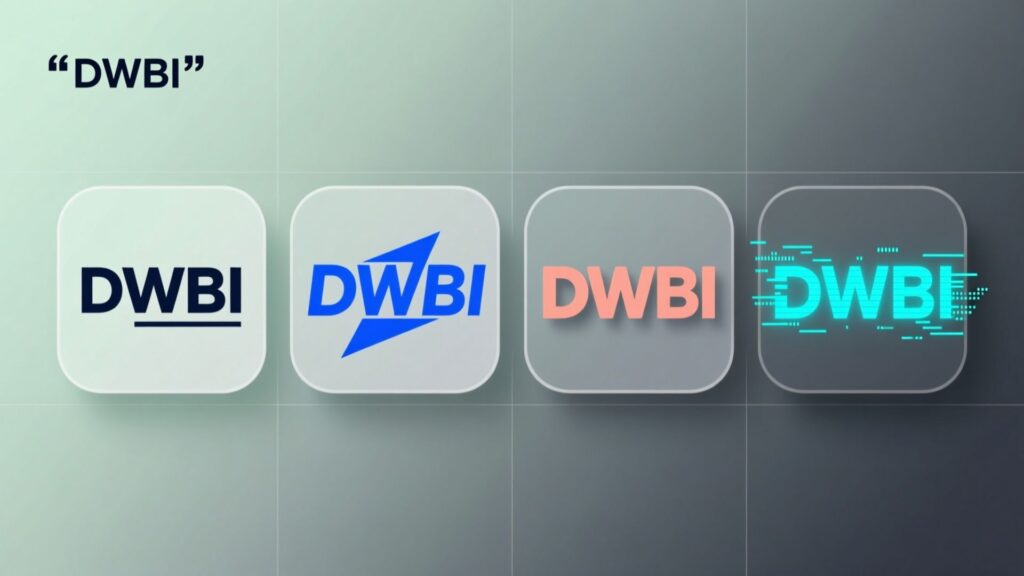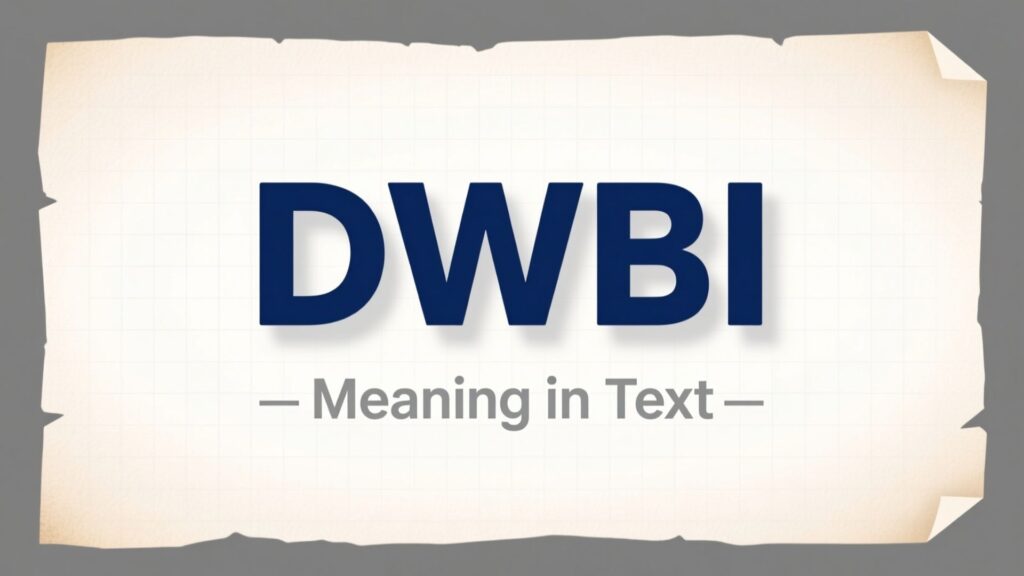DWBI Meaning in Text
In the sea of digital shorthand and texting acronyms, knowing what fits where can save you from awkward replies and miscommunication. One abbreviation that pops up often is DWBI but what does DWBI mean in texting, and when should you use it? This article dives deep into the meaning, the nuance, the proper contexts, and smart alternatives so you can text with confidence in 2025.
What Does “DWBI” Mean in Text?

DWBI stands for “Don’t Worry ’Bout It.”
In simpler terms: when someone says “what does dwbi mean,” they’re asking what message the shorthand conveys. Typically it means:
- “It’s okay. No need to stress.”
- “That issue isn’t a big deal.”
Here are a few quick examples:
- Friend A: “Sorry I messed up the plan.”
Friend B: “DWBI, we can reschedule.” - Colleague: “I forgot to send the draft.”
You: “DWBI, I have it covered.”
On platforms like Urban Dictionary and NoSlang, entries show the same gist: casual reassurance or light dismissal.
Comparing “DWBI” vs “dwabi meaning”
You’ll sometimes see DWABI as a variation. Though less common, it often appears as a misspelling or regional variation of “DWBI” (Don’t Worry ’Bout It) or even sometimes as “Don’t Worry About It.” The key: whether it’s “DWBI meaning” or “dwabi meaning,” the idea remains similar offering a relaxed “no problem” message.
When and How to Use “DWBI”
As a Reassurance Phrase
Use DWBI when someone apologizes or worries about something minor. You want to say “Hey it’s okay, don’t stress.”
Example Scenario:
Friend: “I’m late for the movie my phone died.”
You: “DWBI, grab your popcorn on the way.”
To De-escalate or Dismiss a Topic
Sometimes you want to shut down or lighten a conversation: “It’s not worth it, really.” DWBI serves that role. But this usage can come across as dismissive if tone or context doesn’t match.
Example:
Coworker: “Are you upset I didn’t invite you to the meeting?”
You: “DWBI I heard the summary anyway.”
To Show It’s Not a Big Deal
When someone fears they’ve caused trouble and you genuinely believe it’s small, say DWBI. It signals ease, casualness.
Example:
Partner: “I spilled coffee on your shirt.”
You: “DWBI it washes out.”
Here’s a table summarizing those usages:
| Usage Role | Tone | Best For |
|---|---|---|
| Reassurance (friendly) | Warm, informal | Friends, chat groups |
| De-escalation / dismissal | Slightly casual, blunt | Light office banter, peer chat |
| Signaling insignificance | Relaxed | Minor mishaps, casual replies |
Tone and Context: Understanding Nuances of “DWBI”
Friendly Context ✅
Between friends, “DWBI” often reads as helpful, chill, and quick.
Example: “Thanks for helping with the move.” “DWBI, anytime!”
In this setting you’re using a shorthand that says you care but you’re also easygoing.
Professional Context ⚠️
Here’s where caution enters. In business emails, formal threads or with clients, “DWBI” may feel too casual or even dismissive.
Example: A client writes: “I messed up the report figures.”
Replying: “DWBI, no biggie” might undercut your professionalism.
Better: “No problem — I’ll make the correction.”
Misunderstanding Risk ❌
Since it’s short and informal, “DWBI” can backfire if:
- The recipient reads it as “I don’t care.”
- Cultural differences make the phrase seem flippant.
- Tone of voice is missing (text lacks nuance).
Tip: If unsure whether to use it, pick a clearer phrase.
Alternatives to “DWBI” Based on Tone

Here are better options depending on setting. Always align your word choice with tone and audience.
Polite Alternatives (Formal or Respectful Settings)
- “Please don’t worry about it.”
- “No need to apologize it’s fine.”
- “That’s okay, let’s move forward.”
Professional Alternatives (For Business or Work Emails)
- “I’ve taken care of it; you need not worry.”
- “No issue the matter is resolved.”
- “Thank you for your prompt attention; all is handled.”
Casual Alternatives (Texting Friends or Peers)
- “You’re good no stress.”
- “All good, don’t mind it.”
- “No big deal, we’re cool.”
How to Choose the Right Alternative
When deciding whether to use “DWBI” or an alternative, ask these questions:
- Tone: Is the conversation relaxed or serious?
- Audience: Are you talking to a friend, a boss, a client?
- Medium: Is it a quick chat or a formal email?
- Implication: Does “DWBI” risk sounding dismissive?
Best Practice Guide:
- Use DWBI with friends or in informal chat.
- Switch to more formal phrasing for business or sensitive context.
- When unsure, lean toward clarity and warmth rather than casual shorthand.
15 Best Example Replies Instead of “DWBI”
Here are 15 ready-to-use replies you can plug into messages (casual and formal). Swap in depending on tone:
- “No need to apologize it happens to all of us.”
- “No harm done, really.”
- “It’s under control, so no worries.”
- “Thanks for checking in, but it’s already resolved.”
- “There’s absolutely no issue. Let’s move on.”
- “Mistakes happen. It’s completely fine.”
- “Totally cool. I didn’t even notice.”
- “Forget it it’s nothing serious.”
- “Please don’t stress over it.”
- “No problem at all I’ve got it covered.”
- “It’s not even worth worrying about.”
- “You’re good. Everything’s sorted.”
- “That’s water under the bridge now.”
- “Let’s focus on the next step it’s all fine.”
- “Nothing to worry about on your end.”
Use these as templates and tweak for context. They offer the same reassurance as “DWBI meaning” without risking misinterpretation.
Cultural and Linguistic Nuances: Why Alternatives Matter
Language doesn’t exist in a vacuum. The meaning of “DWBI” shifts across groups, cultures and generations.
- Regional / Age Differences: Younger users (Gen Z) might use “DWBI” casually. Older generations may interpret it as dismissive.
- Digital vs Face-to-Face: Texting removes tone and facial cues. “DWBI” may come off colder without friendly signals.
- Cultural Lens: In cultures valuing formal politeness, “DWBI” might feel too abrupt.
- Variations & Misspellings: You may also encounter “dwabi meaning” or “DWBI” used awkwardly because of auto-correct or unfamiliarity.
Here’s a simple table mapping perception by group:
| Audience | Likely Perception | Recommendation |
|---|---|---|
| Close friends under 30 | Chill, friendly | Feel free to use DWBI |
| Older professionals or elders | Too casual or dismissive | Use a fuller phrase |
| Mixed cultural background chat | Ambiguous tone | Choose clarity over shorthand |
| Formal emails / business context | Unprofessional or lacking warmth | Avoid DWBI entirely |
Real-Life Scenarios: When “DWBI” Works and When It Doesn’t
Case Study 1: Casual Friend Chat
Scenario: Jack texts Jill: “I accidentally double-booked our lunch slot.”
Jill replies: “DWBI I’ll meet you after work instead.”
Outcome: Smooth, friendly, relaxed communication.
Case Study 2: Workplace Message Gone Awry
Scenario: Sara forgot to attach the monthly report. She emails her manager: “Sorry, I forgot the file.”
Her manager replies: “DWBI, I’ll send you the version.”
Outcome: The manager uses “DWBI” in a semi-professional context but it may feel too casual. A better reply: “No worries I have the file and will forward it now.”
Case Study 3: Customer Service Slip-Up
Scenario: Customer: “I received the wrong size.”
Support: “DWBI, we will send the correct one.”
Outcome: Could sound flippant. Better: “We’re sorry about that. I’m sending the correct size now no worries on your end.”
Key lesson: Context shapes the tone. When you use “DWBI meaning,” make sure it aligns with how the reader will perceive you.
Expert Insights on Digital Politeness
“In rapid digital communication, short replies like ‘DWBI’ serve efficiency but risk losing emotional nuance.” Linguist Dr. A. Smith, Journal of Digital Communication (2024)
Researchers note that as texting abbreviations like DWBI become more common, they function as social lubricants helping conversations flow quickly. Yet the trade-off lies in tone ambiguity. One 2023 study found that 35 % of adults interpreted casual acronyms as less empathetic than full phrases.
The takeaway: choosing the right phrase matters almost as much as the message itself.
Final Thoughts: Text Smarter, Sound Warmer
If you ever ask yourself “what does dwbi mean in text?”, now you know: it’s “Don’t Worry ’Bout It.” But more than that it’s a shorthand for care, ease, or subtle dismissal depending on context.
In 2025, digital communication blends speed with emotional intelligence. Using “DWBI” with friends? Fine. But with clients, colleagues, or anyone needing empathy, swap in a fuller phrase.
Aim to be clear. Be kind. Use the right tool for the right chat. Your messages will land smoother and you’ll avoid accidentally sounding like you don’t care.
DWB your shortcut to saying “It’s okay, I’ve got this.”
Bugti is the founder of Quoethint.com, a hub for English language tips, writing advice, and grammar guidance. With years of experience in English studies and a passion for clear communication, Bugti created this platform to make grammar and writing easy to understand for everyone.
